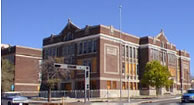

Why is teaching local government important?
Why teach civic engagement to high school students? What are the best approaches to teaching civics? These questions are being addressed nationally by the Center for Information and Research on Civic Learning and Engagement (CIRCLE) at the University of Maryland , and by many foundations. As a teacher in Albuquerque interested in teaching civics, you may be interested in the results of this national research.
The Civic Mission of Schools
Last year, the Carnegie Corporation released a report entitled “The Civic Mission of Schools” on the need for civic learning in schools. Following are excerpts from an article by David S. Broder, Washington Post, February 17, 2003 that summarizes the issues raised in the report.
“The report, drafted by Cynthia Gibson of the Carnegie Corporation and Peter Levine of the Center for Information and Research on Civic Learning and Engagement (CIRCLE), addresses the well-recognized problem of the erosion of political participation by young people in this nation. The concern is bipartisan. William Galston, the University of Maryland professor who heads CIRCLE, is a former domestic policy adviser to President Clinton, but he will be speaking at the forum organized by the Bush administration.
Why the concern? Voting rates among Americans between 18 and 30 are barely half of those of their parents. The 1998 National Assessment of Education Progress (NAEP), a massive test, found that almost one-third of high school seniors lack a basic grasp of the structure and operations of American government.
What to do? The report acknowledges that parents, churches and other voluntary organizations can play a critical role in fostering civic spirit, if they try. But the political parties, which ought to be contributors to that process, often turn off young people, by financing negative ads that send a message that politics and politicians are crooked and sleazy.
That leaves schools. And, as the report says, schools have several advantages as labs of active citizenship. They are “the only institution with the capacity and mandate to reach virtually every young person in the country” and to reach them in the early years when basic attitudes are formed.
Schools are also well equipped to impart basic knowledge of government and politics. And schools are “communities in which young people learn to interact, argue, and work together with others, an important condition for future citizenship.”
The report is admirably clear about what it is not recommending. That is the traditional civics class in which a teacher is “instructing students on the minutiae of federal legislative procedures or election law, without encouraging them to wrestle with larger public issues, underlying principles, and ways for them to participate in local government and civil society.”
In many high schools today, the single required course in civics or government is no more than that kind of rote learning. Instead, what this report recommends is a program that takes a variety of approaches:
• Instruction in government, history, law and democracy. Such knowledge is valuable in itself and can provide a spur to later civic involvement.
• Classroom discussion of current issues and events, especially of teachers make the conversation a model of openness and respect for differing viewpoints.
• Opportunity for community services, particularly in ways that students themselves say are meaningful and reinforce their recognition that their efforts can produce tangible results.
• Extracurricular activities that provide concrete examples of the rewards of participation
• School governance arrangements that give students a real voice in aspects of the education environment that are important to them.
• Simulation of adult civic activities, such as Kids Voting USA, which allows students to mark mock ballots at actual polling places on the eve of election Day, familiarizing them with the mechanics of the process.
Schools face many demands, but Presidents Day should remind us that inculcating the knowledge and skills of citizenship may be the most important of all their functions.”
David S. Broder, Feb. 17, 2003, Washington Post Writers Group
Democracy in Action resources
Below you can find resources for teaching Civic Engagement provided by the Arsalyn Foundation. This site on Democracy in Action provides access to curriculum materials for teaching the basic principles of democracy. Although the site is about the United States government structure, many of the principles hold true for local government as well.
http://www.arsalyn.org/dia.asp
The first two lessons focus on four concepts key to American democracy:
- Majority rule
- Individual rights
- Representation
- The law
The last two lessons focus on the voting process – from registration and information to election campaigns and voting.
Note: Curriculum materials provided on this site are approximately 115 pages in length in pdf format. You may download or order a hard copy through the site's Message Center .

![]()
Albuquerque Political Structure & History
• Albuquerque's Government
• Albuquerque's Public Officers
• Laws That Govern Albuquerque
• History of Albuquerque's Neighborhoods
• Public Resources
Bernalillo County
Political Structure
• The
County's Government
• The County's Public Officers
• Laws That Govern Counties
• Public Resources
